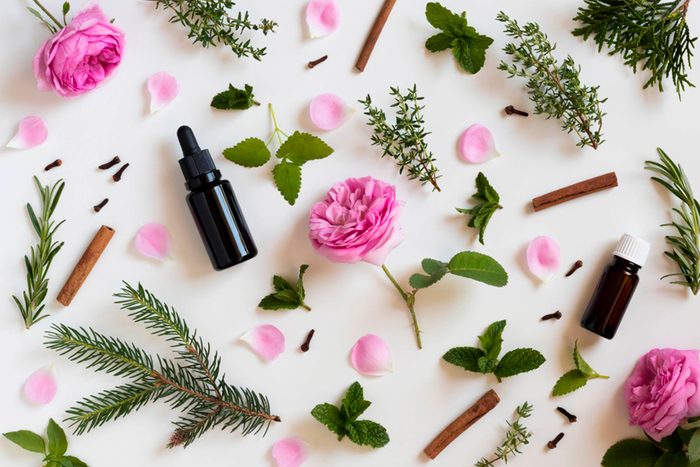
The best essential oils for sleep
Since ancient times, healing herbal oils have been used to calm, relieve stress, and relax the body. And modern research continues to support the benefits of essential oils, as countless studies have shown that certain herbs can intervene in the stress response by keeping cortisol levels in check and restoring calm to the nervous system, says Susan Smith Jones, author, behavioral and transformational specialist, and holistic health expert. But while stress is certainly a concerning factor in America, it correlates directly with another big problem: Americans aren’t getting enough sleep.
“During high periods of stress, the one thing we’re most incapable of doing is getting a good night’s sleep,” says Jones, who taught health and fitness for 30 years at the University of California, Los Angeles. In fact, a survey by the American Psychological Association found that 42 percent of adults reported that their sleep quality is fair or poor and 43 percent of them reported that stress was a key factor in causing them to lie wide awake at night. Thankfully, essential oils can help alleviate both chronic issues plaguing many adults today. We talked to experts in the fields of integrative and herbal medicine to find out the best—and worst—essential oils for sleep.
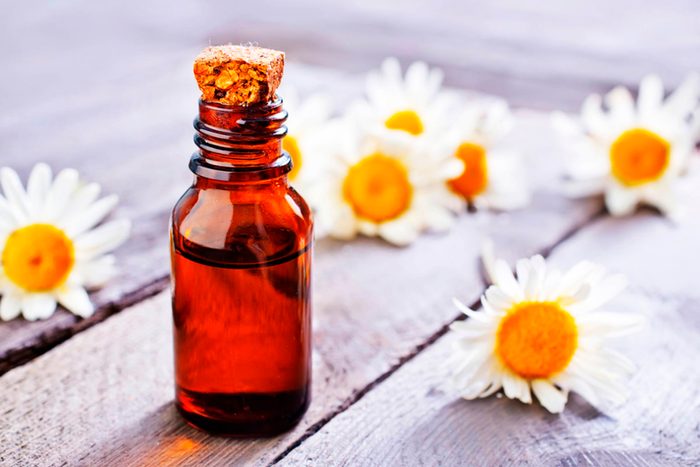
Chamomile oil
You probably associate this herb most with tea, since it’s one of the most popular sipped soothers. Chamomile has been long praised for centuries for its high dose of flavonoids and has been particularly useful for treating digestive and stomach issues. “Its calming effect makes it a salve for stress-related gas, indigestion, and acidity, as well as for peptic ulcers, Crohn’s disease, and irritable bowel syndrome,” says Jones. “Millions also enjoy the fragrant flowers for gently calming the nerves and soothing stress and tension.” As a mild sedative and one of the best essential oils for sleep, she recommends brewing a cup of chamomile oil tea and enjoy it 45 to 60 minutes before bedtime to help relax and drift off to dreamland.”

Rose oil
There’s a reason this rose scent has been used in everything from perfumes to night creams. It’s not only relaxing, but it’s been shown to relieve anxiety, stress, and depression. In fact, a small study of 120 women pregnant for the first time, published in the Iranian Red Crescent Medical Journal, demonstrated a 10-minute inhalation of rose oil with a foot bath helped lessen anxiety while in labor. “They found that aromatherapy with rose oil can reduce anxiety by reducing sympathetic stimulation,” says Elizabeth Trattner, a Florida-state licensed acupuncture physician and certified Doctor of Oriental Medicine and Acupuncture, with a private practice in Miami Beach. Rose oil is also one of the recommended essential oils for sleep because it can help promote feelings of tranquility and security. “I recommend it for bedtime use because it helps you feel grounded, centered, and secure before bedtime.” (Learn if essential oils for high blood pressure are an effective means of lowering your numbers.)
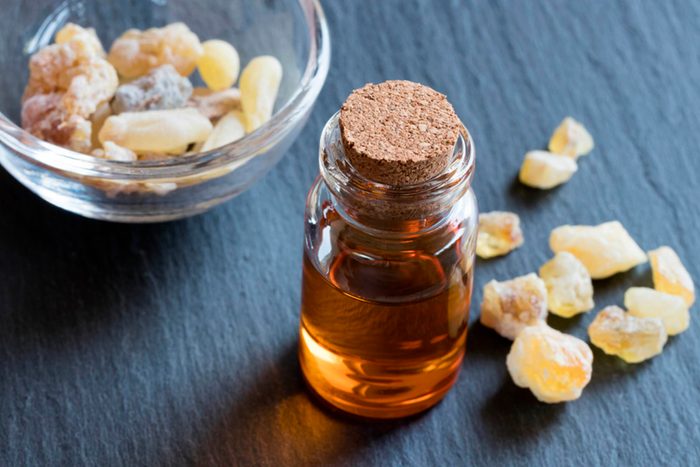
Frankincense
This all-around essential oil has been used since Biblical times to alleviate physical ailments to mental illnesses. “The complex resinous base note of Frankincense helps establish rituals, which makes it particularly useful at nighttime,” says Sara Panton co-founder of essential oil and diffuser brand Vitruvi. “We love using this oil when we are wanting to implement a new wellness habit like a new sleep ritual that will help ground and prepare for sleep.” She recommends adding three drops of Frankincense to the palms of your hands and rubbing them along the bottoms of your feet.
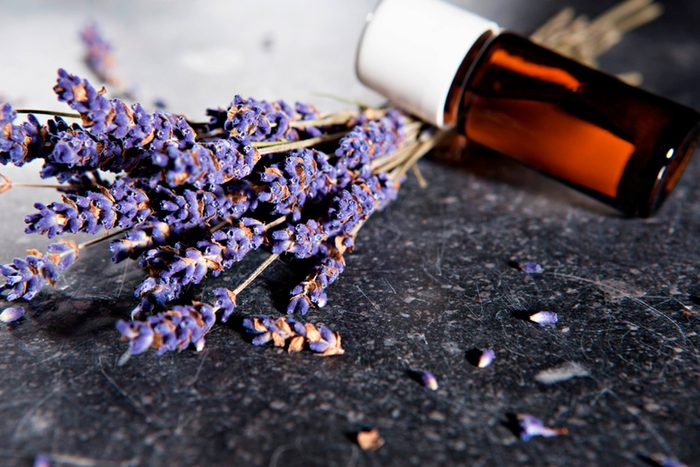
Lavender oil
Lavender is perhaps one of the best-known varieties of essential oil, but not only because of its soothing scent. “Lavender has anti-microbial, fungal, and viral activity to it and is also an analgesic, sedative, anti-anxiolytic,” says Trattner. “It helps with headaches, lice, cysts, muscle pain, digestive issues, depression, nervousness, and many other mood disorders and can also help with PMS as well-being.” For relaxation before bedtime, Trattner suggests mixing a few drops of lavender with clary sage, geranium, and ylang-ylang in a spray bottle of distilled water. “I spray it in my room and on my treatment table to help patients relax before a treatment.”
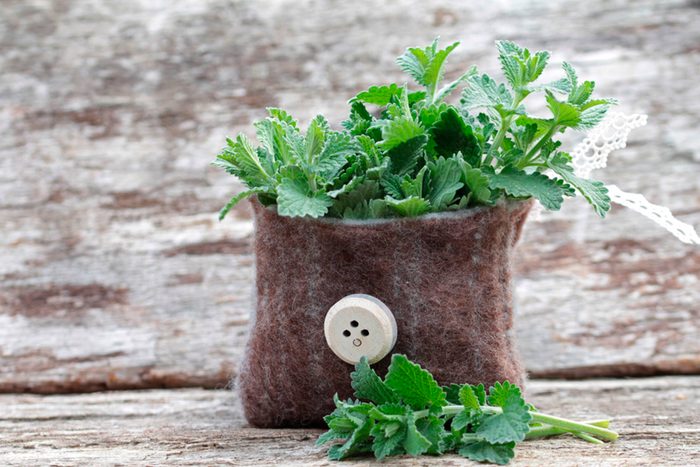
Catnip oil
This stuff might drive cats crazy, but you might be surprised to learn that it has quite the opposite effect on humans. “The aromatic herb known as catnip is a traditional home remedy for quieting the nerves, helping the body unwind, and promoting restful sleep,” says Jones. “This member of the mint family is also the preferred herb for humans who want to soothe a stress-related upset stomach, gas, nausea, and bloating.” She recommends sipping this relaxing, minty brew after dinner or a heavy meal to encourage healthy digestion and to get ready for bedtime. While catnip is good for sleep, cats are not.

Cedarwood oil
Derived from tree bark, cedarwood essential oil has a woody, outdoorsy, and sweet aroma. It’s been used since ancient times for several purposes, from medicinal to cosmetic. “It is good for the skin and the nervous system, benefits the brain and results in improvements in sleep quality and depth, attention span and memory, and mood and emotions,” says Zinia Thomas, MD, a psychiatrist, essential oil aficionado, and co-founder of Radiance Float + Wellness in St. Louis, Missouri. It’s believed to detoxify and clear bad energy overnight making it one of the best essential oils for sleep. “We love using it after break-ups and to help detoxify between seasons!” says Panton. She recommends using it to clear the energy and find your calm before bed. “For a simple cedar sauna experience at home, apply five drops of cedarwood essential oil with ten drops of eucalyptus oil onto your hands and rub briskly together. Breathe deeply.”
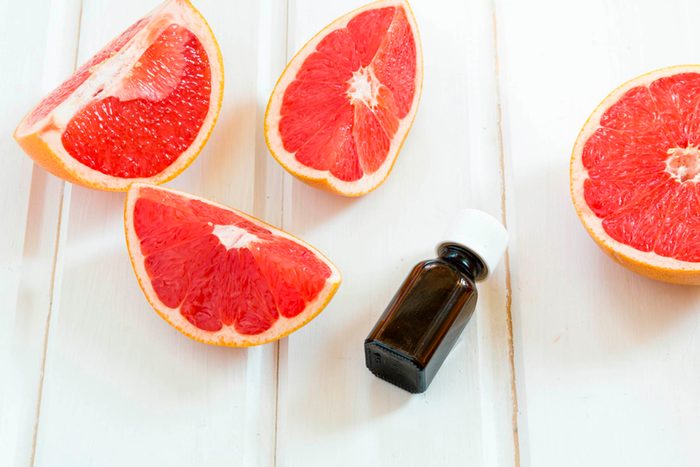
Avoid citrus oil before bedtime
Think grapefruit, lemon, and orange essential oil: They might smell delicious, but their acidic scent energizes and sparks mental alertness, the opposite of what you want when you need some rest. “Because the super citrus oils are ultra-energizing, they’re the perfect way to wake up in the morning naturally, but are not so great at bedtime,” says Panton.
Upon waking, she recommends applying two drops of pink grapefruit oil into the palm of your hands. “Rub together briskly, cup hands lightly over mouth and nose and take three deep breathes,” she adds. “This is especially good for a hangover cure the morning after a fun night.” (Here are more tricks to help you become a morning person.)

Not the best for sleep: Peppermint oil
Its name says it all: Peppermint is one essential oil that is more likely to “pep” you up than put you to sleep. Do not use it as one of your essential oils for sleep.
“It’s wonderful for sore muscles and cramps, as well as digestion and congestion—it will instantly open airways and act as a scented wake-up call,” says Bryn Ewing, wellness coach with DoTERRA Essential Oils.
She recommends adding a few drops of peppermint topically either to sore muscles or to a bug bite to stop the itch. “Apply to the back of the neck on a hot hot day in the sun for an instant cooling sensation and afterward if your skin was in the sun for too long.”

No time for a nap? Try rosemary oil
A member of the mint family, along with oregano, thyme, basil, and lavender, rosemary is another popular essential oil that’s been used for centuries. “It’s not only an excellent anti-bacterial, antifungal, and antiviral, but it also has antiseptic as well, which is why it was burned in French hospitals to purify the air up until the 20th century,” says Trattner.
She recommends combining a few drops of rosemary, lemon, orange, and lavender in a spray bottle to use as a refreshing mist during the day. (Next, find out what your sleep habits are trying to tell you.)

